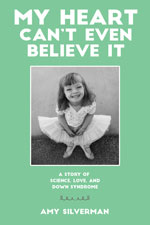
University of Arizona Down Syndrome Researchers Want to See How Your Kid Sleeps (or Doesn’t)
posted Monday May 16th, 2016

I was nervous about the Alzheimer’s studies that ask for brain scans and drug trials, but I agreed to the heart research that only required a blood draw and the saliva samples Ray and I still have to send in.
And I was super eager for Sophie to participate in the sleep study.
There’s a guinea pig aspect to having a kid with Down syndrome (well, there can be, if you’re game) and lots of benefits for the distant and maybe even not-so-distant future. For me, the most intriguing is Jamie Edgin’s sleep research at the University of Arizona in Tucson.
As she explained to me years ago, the concept is fairly simple. People with Down syndrome almost invariably have cognitive issues, and Edgin believes it’s not all in the brain. Some of it, she and others think, has to to do with physical characteristics people with DS tend to have, including the small openings that can lead to sleep dysfunction.
Lack of sleep equals impaired cognitive abilities.
I like the way Jamie Edgin thinks. I got to speak with her a few times as I worked on my book, and she is a fierce champion for the Down syndrome community and for her research. I’ll be in Tucson later this week to read from “My Heart Can’t Even Believe It,” and it seemed like a good time to put out the word about Edgin’s work and her search for study participants.
Her latest work is a collaboration with a UA student named Stella Sakhon. From the description of their work:
“Stella is currently a second year graduate student in the Cognition and Neural Systems program at the University of Arizona. She is investigating alternative language learning gmechanisms in individuals with Down syndrome. Stella is interested in understand more about the way individuals with Down syndrome learn and the role that sleep and attention may play in their language difficulties. Stella is teaching individuals with DS new words using two different strategiesto determine the most effective way of presenting new materials.”
Edgin described their “tireless” work and gets no argument here, but included a comment for me that I have to share here because it will explain how much I love her:
“Amy – this may sound as if we are bragging – but we often do work 7 days a week in my lab. My grad student Dina Spano moved to Phoenix for 4 months and often drove 4 hours a day to finish her work. We never stop. And the only reason that I can give for this is that I people that people with DS deserve research and researchers who will never stop. We understand this and work hard for them. They are not “guinea pigs” to us (many of my staff have family members with DS)- they are what inspires us to work harder and harder…
“When I am up at 3 am at night working on a deadline, it is remembering the >300 people with DS who have come into my life that keeps me going.”
So don’t you want your kid to participate in Stella and Jamie’s latest study?! If you live in Tucson or Phoenix, you are in luck. Here’s the rest of the information:
“The Down Syndrome Research Group at the University of Arizona is currently looking for participants for a study on language learning in individuals with Down syndrome.
“If you have a son or daughter with Down syndrome between 11 and 25 years of age, you and your child are invited to participate in a research study being conducted by Dr. Jamie Edgin and Stella Sakhon.
“The goal of this study is to learn more about different ways of language learning in individuals with Down syndrome. The results can have applications for designing intervention programs for language learning deficits in individuals with Down syndrome.
“If you decide that you and your son or daughter would like to be in this study, we will ask you to visit the Down Syndrome Research Group at the University of Arizona for four visits. Visits can also be conducted in your home and in Phoenix at the end of the summer and in early Fall. At each visit, your son or daughter will play a computer game used to assess their language learning and various memory assessment games.
“As a token of our appreciation, you will be compensated for your time and efforts. We will also provide feedback on your child’s sleep profile.
“If you would like to learn more about this study, please call the Study Coordinator at 520-626-0244 or email: DSRG@email.arizona.edu”
A side note: We tried this study with Sophie a few years ago. She was game (Edgin’s staff was really great with her!) but I couldn’t help but wish that Edgin’s next research will focus on stubbornness when Sophie refused a “redo” after a sleep sensor feel off in the middle of the night. I’m hoping the topic will come up when we are in Tucson and that Sophie will agree. The photo collage above is from #goodnightsophie — a series I’ve shot of her in recent months and years that I believe demonstrates there are some sleep issues there! And that sleep (on Sophie, anyway) is pretty photogenic.
Amy’s book, “My Heart Can’t Even Believe It: A Story of Science, Love, and Down Syndrome,” was published by Woodbine House this spring and is available through Amazon and Changing Hands Bookstore. Amy and Sophie will be reading and signing books at Antigone Books in Tucson on Friday, May 20 at 7 pm (books will be for sale there, too). For more information about tour dates and other events visit myheartcantevenbelieveit.com and here’s a book trailer.







Leave a Reply